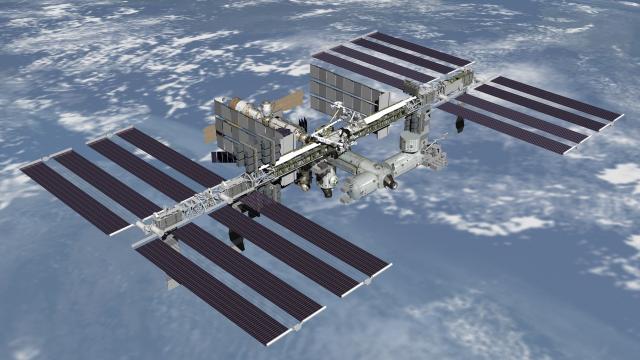A tiny pressure leak has been detected on the Russian side of the International Space Station. It sounds alarming, but flight controllers say the astronauts aren’t in any immediate danger.
When the six astronauts aboard the ISS woke up at the usual time this morning, they were greeted with some rather disquieting news. At about 9:00AM AEST yesterday, flight controllers at Mission Control in Houston and at the Russian Mission Control Center outside Moscow detected a small leak in the complex.
The situation wasn’t considered serious or life threatening, so the decision was made to let the Expedition 56 crew sleep. Once awake, the astronauts were filled in on the situation and procedures began to determine the location of the leak.
“An emergency situation occurred on the ISS at night and in the morning: A drop in pressure and an air leak aboard the station. Measures were taken to determine the origin of the leak,” explained Dmitry Rogozin, Head of Russia’s State Space Corporation Roscosmos, in a TASS report.
“The US crew gathered in the Russian segment and subsequently compartments were sealed off one by one to understand what happened and where. As a result, we localised the problem.”
The leak was found on the Russian side of the orbital outpost, specifically, a compartment of the Soyuz MS-09 module, which arrived at the ISS in June of this year. In classic handyman fashion, the crew used Kapton tape to seal-up the tiny hole while a better solution is being contemplated, America’s ABC News reports.
The Soyuz module isn’t needed to get the crew back down to the surface, so the crew just needs to make sure the leak is stopped. The fate of the module is not yet known.
The tiny fracture is thought to have formed on the outside when a micro-meteorite struck the ISS. Both NASA and Roscosmos are assuring the public that the astronauts aren’t in any danger, and that the space station isn’t at risk of depressurising.
“A spacewalk for the purposes of repairs won’t be required,” Rogozin told Tass. “If an air leak goes from the inside into outer space, then it is better to install a plate precisely from the inside. Owing to the pressure factor, it will be fastened better.”
It sounds like everything’s going to be OK, but this episode is yet another stark reminder that space is a dangerous place.
